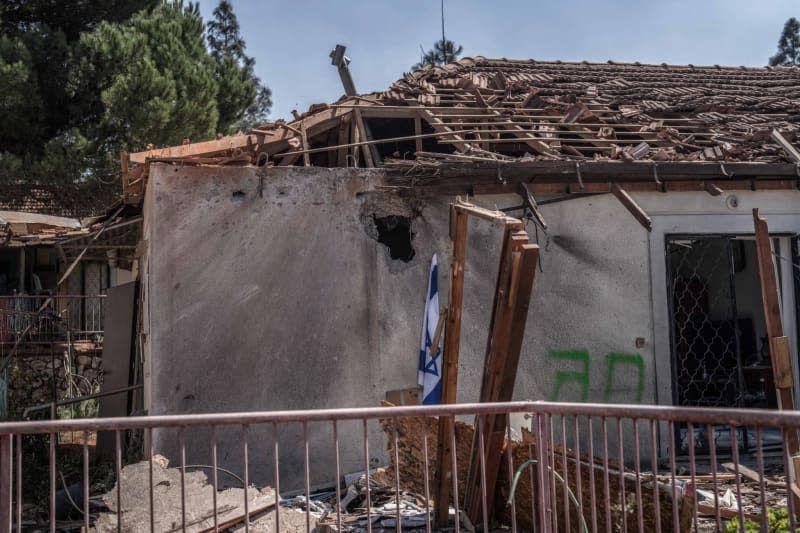Fighting between Israel and the Lebanese Hezbollah militia continued on Thursday, with hundreds killed and tens of thousands of people displaced in Lebanon since Israel began its massive bombardment four days ago.
Following months of cross-border skirmishes between Israeli forces and the Iran-backed militia, which says it acts out of solidarity with Hamas in Gaza, Israel began an intense aerial campaign to strike Hezbollah targets on Monday – with the region now on the brink of all-out war.
International efforts are under way to negotiate a ceasefire, but Israeli Prime Minister Benjamin Netanyahu denied any plan had been agreed to and vowed to keep hitting Hezbollah with “full force.”
At least 92 people died and more than 150 people were injured in Lebanon on Thursday from Israeli attacks, the Lebanese Ministry of Health said.
More than 600 people have been killed this week, according to the Lebanese authorities. Among them are more than 100 Syrian refugees, according to human rights activists.
A total of 70,100 displaced people are currently registered in 533 emergency centres, Lebanese Interior Minister Bassam Mawlawi said.
Israeli Defence Minister Yoav Gallant said attacks would continue despite calls for a ceasefire and that he had “approved the next set of operations.”
“We continue to eliminate Hezbollah terrorists, dismantle offensive infrastructure, and destroy rockets and missiles,” he posted on X.
Israel: Hezbollah’s drone chief killed
The Israeli military said an airstrike near Beirut killed a senior Hezbollah commander who was responsible for the group’s drone fleet.
The Israel Defense Forces (IDF) said air unit commander Muhammad Hussain Sarur was killed in the targeted attack.
A witness said the third floor of an 11-story building was hit in the Jamous neighbourhood to the south of Beirut, an area considered a Hezbollah stronghold.
Lebanon’s Health Ministry said at least two people were killed and 15 wounded in the bombing.
The strike took place close to where a high-ranking Hezbollah military commander, Ibrahim Akil, was killed last week.
Southern Lebanon and northern Israel under fire
The Israeli army was also continuing its airstrikes in the south and east of Lebanon with the military saying the air force had hit around 220 Hezbollah militia targets, including weapons depots and rocket launching pads.
Hezbollah said it launched 80 rockets at the Israeli city of Safed and another 50 at the town of Ahihud, as well as military sites in northern Israel.
Since Thursday morning, the Israeli army said that some 170 rockets had been launched from Lebanon, with some of the impacts reportedly causing fires to break out around Safed.
Israeli attacks Syria targets for first time this week
Israel has also attacked infrastructure used by Hezbollah along the Lebanese-Syrian border, specifically routes used by Hezbollah to bring weapons to Lebanon via Syria, according to the army.
Four border crossings have been hit since Israel intensified its attacks in Lebanon on Monday, Lebanese security sources said.
The Syrian Observatory for Human Rights, which has been documenting violence in Syria since 2011, said Israeli fighter jets attacked a border crossing in the area around the Syrian town of al-Qusayr, near the border with Lebanon.
The war monitor said several people were injured.
It is the first Israeli attack on Syrian territory since Monday, the observatory said.
According to the war monitor, Hezbollah tried to use the border crossings to bring more fighters from Yemen and Iraq into the country.
They were supposed to come in the country to support the Shiite militia in the event of a feared ground offensive by the Israeli military, it said.
As a result of the Israeli attacks in Lebanon, around 13,500 people have fled to Syria since Monday, most of them Syrian citizens, according to the Lebanese Interior Ministry.
An estimated 1.5 million Syrian refugees live in Lebanon.
Netanyahu denies report of imminent ceasefire
While a group of countries led by the US and France is working to secure a deal for a 21-day ceasefire between the two sides, Israeli Prime Minister Benjamin Netanyahu rejected a report he has given the green light for the plan.
“The report about a ceasefire is incorrect,” a statement from Netanyahu’s office said. “This is an American-French proposal that the prime minister has not even responded to.”
A report by broadcaster N12 that Netanyahu had instructed the army to reduce attacks in the northern neighbouring country was also “the opposite of the truth,” his office said. “The prime minister has directed the IDF to continue fighting with full force, according to the plan that was presented to him.”
A joint demand for a ceasefire lasting 21 days was earlier issued by a handful of countries, including the US, Germany, France, Saudi Arabia, the United Arab Emirates and Qatar.
The pause is intended to create space for a diplomatic solution to the conflict between Israel and Hezbollah in Lebanon, as well as the nearly year-long Gaza war.











